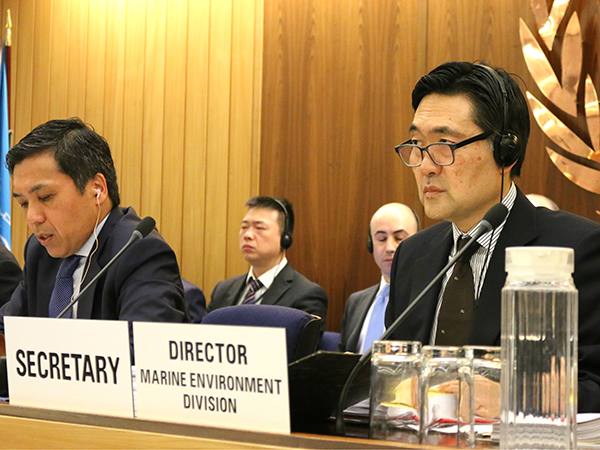Comprehensive set of guidance and guidelines to support the consistent implementation of 2020 sulphur limit agreed.

The IMO Marine Environment Protection Committee (MEPC), meeting for its 74th session (13-17 May), approved various guidance and guidelines to support the implementation of the sulphur 2020 limit from 1 January 2020.
- Adopted 2019 Guidelines for consistent implementation of the 0.50% sulphur limit under MARPOL Annex VI - with sections on the impact on fuel and machinery systems resulting from new fuel blends or fuel types; verification issues and control mechanism and actions, including port State control and samples of fuel oil used on board; a standard reporting format for fuel oil non-availability (fuel oil non-availability report (FONAR); and possible safety implications relating to fuel oils meeting the 0.50% sulphur limit.
The 2019 Guidelines on consistent implementation of 0.50% sulphur limit under MARPOL Annex VI adopted by resolution MEPC.320(74) are available here.
- Adopted 2019 Guidelines for port State control under MARPOL Annex VI Chapter 3, providing updated enforcement guidance for provisions including regulation 13 “nitrogen oxides” and regulation 14 “sulphur oxides and particulate matter”.
- Approved Guidance on indication of ongoing compliance in the case of the failure of a single monitoring instrument, and recommended actions to take if the exhaust gas cleaning system (EGCS) fails to meet the provision of the Guidelines.
- Approved Guidance for port State control on contingency measures for addressing non-compliant fuel oil. The guidance covers possible actions to be taken, following discussions between ship, flag State and port State, when a ship is found to have on board non-compliant fuel oil either as a consequence of compliant fuel oil being not available when the ship bunkered fuel oil or the ship identifying through post bunkering testing that the fuel oil on board is non-compliant.
- Approved the 2019 Guidelines for on board sampling for the verification of the sulphur content of the fuel oil used on board ships.
- Approved an MSC-MEPC circular on Delivery of compliant fuel oil by suppliers, subject to approval by the Maritime Safety Committee (MSC 101) in June. The draft circular says that Members States should urge fuel oil suppliers to take into account, as relevant: MEPC.1/Circ.875 Guidance on best practice for fuel oil purchasers/users for assuring the quality of fuel oil used on board ships; and MEPC.1/Circ.875/Add.1 Guidance on best practice for fuel oil suppliers for assuring the quality of fuel oil delivered to ships.
- Approved Guidance for best practice for Member State/coastal States. This includes best practices intended to assist Member States in carrying out their responsibilities under MARPOL Annex VI, to ensure effective implementation and enforcement of statutory requirements of that Annex. The guidance says that Member States/coastal States should consider actions deemed appropriate, under domestic legal arrangements, with respect to promoting the availability of compliant fuel oils, consistent with regulation 18.1 of MARPOL Annex VI; and Member States or other relevant authorities desiring to do so may decide to establish or promote a licensing scheme for bunker suppliers.
The 2019 Guidelines on consistent implementation of 0.50% sulphur limit under MARPOL Annex VI adopted by resolution MEPC.320(74) are available here. These comprehensive guidelines include a template for a "Fuel Oil Non-Availability Report (FONAR)" set out in Appendix 1 and a "Technical review of identified possible potential safety implications associated with the use of 2020 compliant fuels" set out in appendix 2.
- Draft amendments to Regulation 2 Definitions, to include new definitions for “Sulphur content of fuel oil” - meaning the concentration of sulphur in any fuel oil, measured in % m/m as tested in accordance with standard acceptable to the Organization; “Low-flashpoint fuel”, to mean gaseous or liquid fuel having a flashpoint lower than otherwise permitted under paragraph 2.1.1 of SOLAS regulation II-2/4; “MARPOL delivered sample”, to mean the sample of fuel oil delivered in accordance with regulation 18.8.1 of MARPOL Annex VI; “In-use sample”, to mean the sample of fuel oil in use on a ship; and “On board sample”, to mean the sample of fuel oil intended to be used or carried for use on board that ship.
- Fuel oil sampling and testing - Draft amendments to Regulation 14 Sulphur oxides (SOX) and particulate matter, to add new paragraphs related to in-use and on board fuel oil sampling and testing, to add new paragraphs to require one or more sampling points to be fitted or designated for the purpose of taking representative samples of the fuel oil being used or carried for use on board the ship. The representative samples of the fuel oil being used on board are to be taken in order to verify the fuel oil complies with the regulation.
- Appendix I amendments to the International Air Pollution Prevention (IAPP) certificate - Draft consequential amendments to update the IAPP certificate to add a reference to sampling points and also to note where there is an exemption to the provision for low-flashpoint fuel.
- Appendix VI Fuel verification procedure for MARPOL Annex VI fuel oil sample Draft consequential amendments to verification procedures, to cover verification of the representative samples of in-use fuel oil and on board fuel oil.

